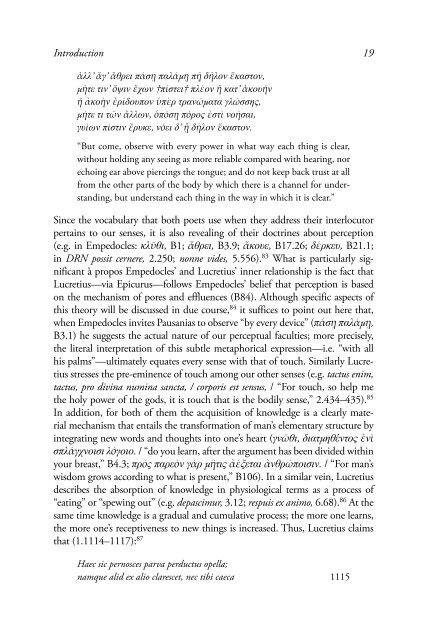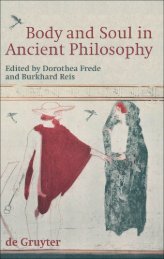- Page 2 and 3: Studies in Classics Edited by Dirk
- Page 4 and 5: Empedocles REDIVIVUS: Poetry and An
- Page 6: Contents Abbreviations vii Permissi
- Page 9 and 10: viii Abbreviations OCD Oxford Class
- Page 12 and 13: Acknowledgments This book is a revi
- Page 14 and 15: Introduction 1.1 EMPEDOCLES’ CARM
- Page 16 and 17: Introduction 3 personal undertones
- Page 18 and 19: Introduction 5 To announce himself
- Page 20 and 21: Introduction 7 completely disregard
- Page 22 and 23: Introduction 9 omnis natura creet r
- Page 24 and 25: Introduction 11 is without them? No
- Page 26 and 27: Introduction 13 fact impossible to
- Page 28 and 29: Introduction 15 flammarum . . . ira
- Page 30 and 31: Introduction 17 At this point commi
- Page 34 and 35: Introduction 21 ut fit ubi insolita
- Page 36 and 37: Introduction 23 atoms, she is perva
- Page 38 and 39: Introduction 25 As Clay astutely ob
- Page 40 and 41: Introduction 27 cosmic overture for
- Page 42 and 43: Chapter One Personification 2.1 INT
- Page 44 and 45: Personification 31 Therefore, by no
- Page 46 and 47: Personification 33 that his techniq
- Page 48 and 49: Personification 35 νῦν αὖτ
- Page 50 and 51: Personification 37 mutation in Aphr
- Page 52 and 53: Personification 39 to excel, endowe
- Page 54 and 55: Personification 41 Sedley goes so f
- Page 56 and 57: Personification 43 the muse Calliop
- Page 58 and 59: Personification 45 now qualifies ai
- Page 60 and 61: Personification 47 1.565; mollia, 1
- Page 62 and 63: Personification 49 is an inverse pr
- Page 64 and 65: Personification 51 substance obey.
- Page 66 and 67: Personification 53 “they demonstr
- Page 68 and 69: Personification 55 brought together
- Page 70 and 71: Personification 57 Jobst was the fi
- Page 72 and 73: Personification 59 “and the thing
- Page 74 and 75: Personification 61 at once this is
- Page 76 and 77: Personification 63 ᾿Επεὶ δ,
- Page 78 and 79: Personification 65 figures, not all
- Page 80 and 81: Personification 67 ancient arrangem
- Page 82 and 83:
Personification 69 “And therefore
- Page 84 and 85:
Personification 71 will counterbala
- Page 86 and 87:
Personification 73 as the things ar
- Page 88 and 89:
Personification 75 derive from riva
- Page 90 and 91:
Personification 77 completely indep
- Page 92 and 93:
Personification 79 propterea non es
- Page 94 and 95:
Personification 81 the Stoic presen
- Page 96 and 97:
Personification 83 It seems plausib
- Page 98 and 99:
Personification 85 “But the intel
- Page 100 and 101:
Personification 87 According to a t
- Page 102 and 103:
Personification 89 Table 1. 1 st so
- Page 104 and 105:
Personification 91 Table 2. 1st Sou
- Page 106 and 107:
Personification 93 nec manet ulla s
- Page 108 and 109:
Chapter Two Similes 3.1 INTRODUCTIO
- Page 110 and 111:
Similes 97 ultimate intention was n
- Page 112 and 113:
Similes 99 et tamen est quidam locu
- Page 114 and 115:
Similes 101 embedded in the phrase,
- Page 116 and 117:
Similes 103 each other and eventual
- Page 118 and 119:
Similes 105 explanation. Neverthele
- Page 120 and 121:
Similes 107 Lucretius metaphoricall
- Page 122 and 123:
Similes 109 antemnas proram malos t
- Page 124 and 125:
Similes 111 viewed as a stream (clo
- Page 126 and 127:
Similes 113 the girl releases her h
- Page 128 and 129:
Similes 115 a probative and illustr
- Page 130 and 131:
Similes 117 This Empedoclean probat
- Page 132 and 133:
Similes 119 6.177 → natural law:
- Page 134 and 135:
Similes 121 3.4.2.1. Various Contai
- Page 136 and 137:
Similes 123 nec mirum, cum plena an
- Page 138 and 139:
Similes 125 flow together from the
- Page 140 and 141:
Similes 127 an archetypal-like cont
- Page 142 and 143:
Similes 129 “Now attend, and I wi
- Page 144 and 145:
Similes 131 ὡς δ’ ὅτ’
- Page 146 and 147:
Similes 133 destructive, when they
- Page 148 and 149:
Similes 135 “But the cold mind of
- Page 150 and 151:
Similes 137 overwhelming effects; a
- Page 152 and 153:
Similes 139 and overflows onto the
- Page 154 and 155:
Similes 141 “The mind has also th
- Page 156 and 157:
Similes 143 In a different context,
- Page 158 and 159:
Similes 145 Another such example is
- Page 160 and 161:
Similes 147 exhale a mist, and the
- Page 162 and 163:
Similes 149 we could even go so far
- Page 164 and 165:
Chapter Three Metaphors 4.1 INTRODU
- Page 166 and 167:
Metaphors 153 are metaphors accepta
- Page 168 and 169:
Metaphors 155 Empedocles’ metapho
- Page 170 and 171:
Metaphors 157 doing so by specific
- Page 172 and 173:
Metaphors 159 τε καὶ φέρε
- Page 174 and 175:
Metaphors 161 Empedocles also draws
- Page 176 and 177:
Metaphors 163 ἔστιν ἄτομ
- Page 178 and 179:
Metaphors 165 away and is extinguis
- Page 180 and 181:
Metaphors 167 It is also possible t
- Page 182 and 183:
Metaphors 169 Principio fluere e la
- Page 184 and 185:
Metaphors 171 Lucretius refutes Emp
- Page 186 and 187:
Metaphors 173 Nec tamen omnimodis c
- Page 188 and 189:
Metaphors 175 νῦν γεγάασ
- Page 190 and 191:
Metaphors 177 both something concre
- Page 192 and 193:
Metaphors 179 are responsible for v
- Page 194 and 195:
Metaphors 181 dicere credas, / quat
- Page 196 and 197:
Metaphors 183 the first beginnings
- Page 198 and 199:
Metaphors 185 analogous function of
- Page 200 and 201:
Metaphors 187 life by coincidence.
- Page 202 and 203:
Metaphors 189 term, to qualify atom
- Page 204 and 205:
Metaphors 191 he talks of their mot
- Page 206 and 207:
Metaphors 193 In more general terms
- Page 208 and 209:
Metaphors 195 flaw, and that by thi
- Page 210 and 211:
Metaphors 197 -I do indeed. -‘Gra
- Page 212 and 213:
Metaphors 199 the surroundings and
- Page 214 and 215:
Metaphors 201 mutat enim mundi natu
- Page 216 and 217:
Metaphors 203 cluster is compared t
- Page 218 and 219:
Metaphors 205 drawn from one of the
- Page 220 and 221:
Metaphors 207 in the poem with posi
- Page 222 and 223:
Metaphors 209 the human body and fo
- Page 224 and 225:
Metaphors 211 it; further by the ac
- Page 226 and 227:
Metaphors 213 When Lucretius applie
- Page 228 and 229:
Metaphors 215 burning flames and sh
- Page 230 and 231:
Metaphors 217 frigore cum premitur,
- Page 232 and 233:
Metaphors 219 quae quia sunt exerci
- Page 234 and 235:
Epilogue This study has approached
- Page 236 and 237:
Notes NOTES TO THE INTRODUCTION 1.
- Page 238 and 239:
Notes to the Introduction 225 13. C
- Page 240 and 241:
Notes to the Introduction 227 38. C
- Page 242 and 243:
Notes to the Introduction 229 affin
- Page 244 and 245:
Notes to the Introduction 231 the G
- Page 246 and 247:
Notes to Chapter One 233 127. Fried
- Page 248 and 249:
Notes to Chapter One 235 mechanism
- Page 250 and 251:
Notes to Chapter One 237 55. See Ge
- Page 252 and 253:
Notes to Chapter One 239 67.II.14 S
- Page 254 and 255:
Notes to Chapter One 241 the contra
- Page 256 and 257:
Notes to Chapter One 243 149. Cf. D
- Page 258 and 259:
Notes to Chapter One 245 176. Lück
- Page 260 and 261:
Notes to Chapter Two 247 accepted t
- Page 262 and 263:
Notes to Chapter Two 249 20. E.g. M
- Page 264 and 265:
Notes to Chapter Two 251 56. Wright
- Page 266 and 267:
Notes to Chapter Two 253 6.311; exc
- Page 268 and 269:
Notes to Chapter Two 255 125. Cf. a
- Page 270 and 271:
Notes to Chapter Three 257 14. Sedl
- Page 272 and 273:
Notes to Chapter Three 259 51. Schi
- Page 274 and 275:
Notes to Chapter Three 261 Plato’
- Page 276 and 277:
Notes to Chapter Three 263 120. Cf.
- Page 278 and 279:
Notes to Chapter Three 265 147. Kol
- Page 280 and 281:
Notes to Chapter Three 267 heavier
- Page 282 and 283:
List of Translations Aristotle, On
- Page 284 and 285:
Bibliography Abry, J.-H. (1999),
- Page 286 and 287:
Bibliography 273 Naturphilophie bei
- Page 288 and 289:
Bibliography 275 ———. (2000),
- Page 290 and 291:
Bibliography 277 ———. (2000b)
- Page 292 and 293:
Bibliography 279 Grilli, A. (1979),
- Page 294 and 295:
Bibliography 281 Kleve, K. (1963),
- Page 296 and 297:
Bibliography 283 ———. (1971),
- Page 298 and 299:
Bibliography 285 Murley, C. (1947),
- Page 300 and 301:
Bibliography 287 Rawson, E. (1985),
- Page 302 and 303:
Bibliography 289 Doxographical, and
- Page 304 and 305:
Bibliography 291 ———. (2003b)
- Page 306 and 307:
Index Locorum A Achilles Introducti
- Page 308 and 309:
Index Locorum 295 911: 245 937: 264
- Page 310 and 311:
Index Locorum 297 B 1: 19, 224 B 2.
- Page 312 and 313:
Index Locorum 299 B 95: 35 (cited),
- Page 314 and 315:
Index Locorum 301 163 (Diog. Laert.
- Page 316 and 317:
Index Locorum 303 25: 7, 232 25-43:
- Page 318 and 319:
Index Locorum 305 1040: 261 1048: 2
- Page 320 and 321:
Index Locorum 307 438: 179 (cited)
- Page 322 and 323:
Index Locorum 309 471-479: 77-78 (c
- Page 324 and 325:
Index Locorum 311 495-507: 128-130
- Page 326 and 327:
Index Locorum 313 Anthologia Palati
- Page 328 and 329:
General Index A Aether: in Lucretiu
- Page 330 and 331:
General Index 317 as container of a
- Page 332 and 333:
General Index 319 253 n. 90; furnac
- Page 334 and 335:
General Index 321 156-187; of filli
- Page 336 and 337:
General Index 323 furnace: 126; met






![[Niall_Livingstone]_A_Commentary_on_Isocrates'_Busiris](https://img.yumpu.com/51449110/1/163x260/niall-livingstone-a-commentary-on-isocrates-busiris.jpg?quality=85)

![[Richard_Sorabji]_Self__Ancient_and_Modern_Insigh(BookFi.org)](https://img.yumpu.com/30857691/1/174x260/richard-sorabji-self-ancient-and-modern-insighbookfiorg.jpg?quality=85)




